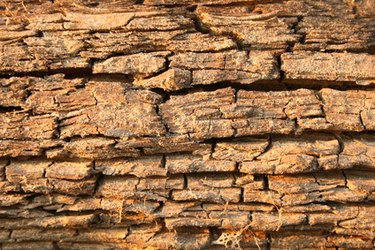Things You'll Need
Sandpaper
Wood putty
Fungicidal preservative
Chisel
Drill
Wire brush

Dry rot is one of the most common problems that can damage the wood in your home. It is caused by a fungus that breaks down the structural integrity of timber, leaving it brittle and weak. If it isn't dealt with, dry rot can completely destroy wood, so it's absolutely vital to take immediate action as soon as you discover a problem. There are also several measures you can take to prevent dry rot from happening in the first place.
Step 1
Protect the wood in your house from excess moisture. Ironically enough, the dry rot fungus actually requires moisture to thrive, and in reality, excess moisture is the primary cause of the problem. Common sources of moisture include leaky plumbing and leaks in your roof.
Video of the Day
Step 2
Before you can get rid of any dry rot, you first have to identify it. The fungus that produces dry rot can be recognized by thin grey tendrils heading out in all directions. In more moist conditions it is sometimes accompanied by white fuzz. As it matures, dry rot can develop pancake-shaped bodies that release spores.
Step 3
Determine whether your dry rot problem is small enough for you to treat yourself. If the problem is severe, and covers a large area, you'll want to rely on a professional. If it's a relatively small area, and fairly self contained, you may want to try dealing with it on your own. Realize that determining the extent of a dry rot problem can be quite difficult, and if you're in doubt, you should get a professional to handle the problem for you.
Step 4
If you decide to handle the problem yourself, first you need to deprive the area of any moisture, and make sure it's well ventilated to keep the area dry in the future.
Step 5
Cut and dig out all lumber within 18 inches of the visible rot with a chisel. If the area is too large to be dealt with using a chisel, then that's a good sign that you need a professional.
Step 6
Use a wire brush on any masonry near the infection.
Step 7
Gather all your debris and dispose of it, preferably by burning.
Step 8
Apply at least three coats of fungicidal preservative to all wood, masonry, drywall and plaster in a five-foot radius around the rotted area.
Step 9
If the dry rot has penetrated deep into the wood, drill holes angled downward at regular intervals in the area of infestation from both sides, and fill them with fungicidal preservative.
Step 10
Repair the holes with wood putty, and then sand the area to get a smooth finish.
Step 11
Cover any replacement wood in fungicidal preservative before installing.
Warning
These instructions only apply to very simple and small infestations.
If the area of dry rot is part of your home's support structure, you should definitely let a professional handle it.
Video of the Day